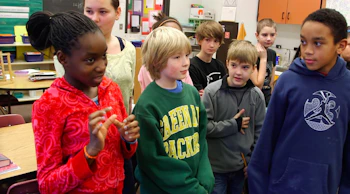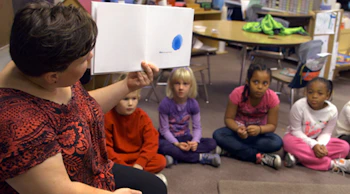

Lesson Plans to Prevent Bias-Based Bullying
Welcoming Schools teacher-friendly lesson plans are designed to help educators create inclusive classrooms and schools using an anti-racist, intersectional lens. Most bullying is based on biases, stereotypes and prejudice.
These lessons help you lead your students in real conversations about the kinds of bullying they really see and hear at school, learning how they can be upstanders to help prevent bullying.

Secondary Identifying Allies
An important part of bullying prevention is identifying allies. We do this by exploring what makes someone an ally and identifying the actions of allies. When our students are informed and prepared, they are more likely to be allies. [6 - 12]

Name-Calling and Feeling Safe in School
Talk directly with your students about where they feel safe in your school, where they don’t and why. This lesson is featured in the Welcoming Schools video, What Can We Do? Bias, Bullying, & Bystanders. [3 – 6]

Making Decisions: Ally or Bystander
Help your students think through what they can do if they see bullying and how they can respond to LGBTQ, racial or religious slurs. This lesson is featured in the Welcoming Schools video, What Can We Do? Bias, Bullying, & Bystanders. [K – 12]

Words That Hurt And Words That Heal
Using the book, One, talk with students about bullying and standing up for each other. (Other books can be used with this lesson as well.) This lesson is featured in the HRC Welcoming Schools film, What Can We Do? Bias, Bullying, & Bystanders. [K – 3]

The Name Jar: The Names We Want to be Called
This lesson offers an opportunity to build a classroom community. Students will read and discuss the book The Name Jar by Yangsook Choi. Then, students will have a chance to share and learn about their names by creating a name art project. [K - 3]

Appreciating Differences and Acknowledging Stereotypes: "Lemons" and "Apples"
This lesson helps students really look at what makes a person (or a potato) an individual beyond stereotypes. [3 – 6]

We Are All Human Beings
The book Whoever You Are by Mem Fox urges us to accept our differences, recognize our similarities, and most importantly, rejoice in both. This lesson encourages students to think about needs and feelings that are common for all human beings. [K - 2]

My Many Identities
Students engage in activities that help them understand the complexity of identity and name aspects of identity that are important to them and then discuss ways to create a classroom where everyone can share their whole selves without fear of bullying or harassment. [4 - 8]

Ally Reading Buddies
After reading a book showing ally behavior, with a classroom partner or a reading buddy from an upper grade, students will discuss what they can do to support and encourage each other. [K – 1 plus 3 – 5]

Harvey Milk and the Rainbow Flag with Symbols of Us: Identity Capes and Flags
The book, PRIDE: The Story of Harvey Milk and the Rainbow Flag by Rob Sanders looks at the hopes that Milk had for LGBTQ people and the Pride flag. Afterwards, students will create an original flag or cape design representing their own identities. [3 - 5]

Learning About Each Other Through Poetry: BioPoems
Here's a fun activity for the beginning of the school year to foster connections between students. [3 - 6]

Do You See Yourself in Books?
After an inspiring video about Marley Dias the #1000BlackGirlBooks project, students will look at characters in a selection of classroom books. They will look to see if characters represent their identities or not and reflecting on how that might make them feel. [3 - 5]

Standing Up for Each Other: Drawing Ally Superheroes
Explore the concept of ally behavior with students. Then, each student will draw a cartoon version of themselves that embodies non-violent superpowers to help others in their school or to solve a problem in the world. [K - 5]

A Welcoming Classroom
What makes you feel welcome or unwelcome? With the book The New Girl… And Me, discuss what your class can do to help others feel welcome. [K - 2]

Social Justice Acrostic Poems
Students work as a class to generate social justice words and then with a classmate, they will write an acrostic poem. This activity encourages students to explore issues that they care about with their peers and to form connections with each other. [3 - 5]

Valuing Diversity with "The Big Orange Splot"
Read and discuss the fun book, The Big Orange Splot, by Daniel Pinkwater to show appreciation of individuality and being kind to neighbors. [K - 2]
- Topics:
- Bullying


